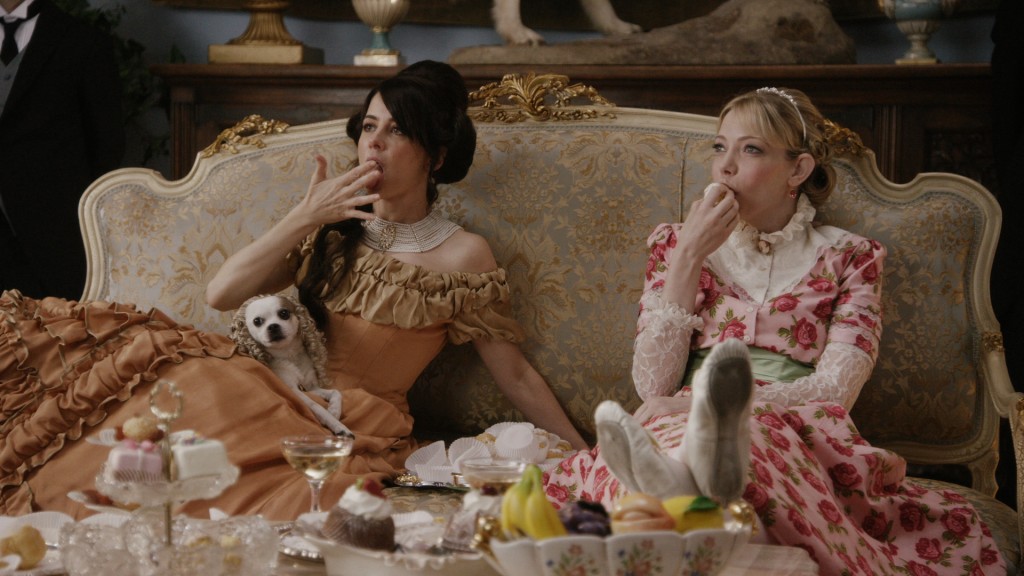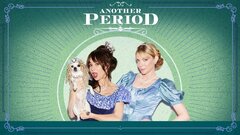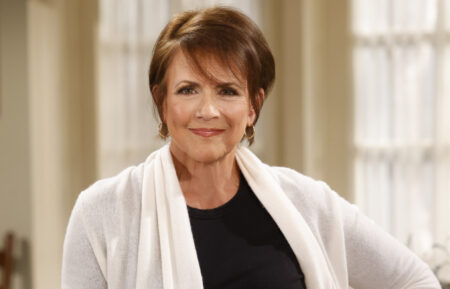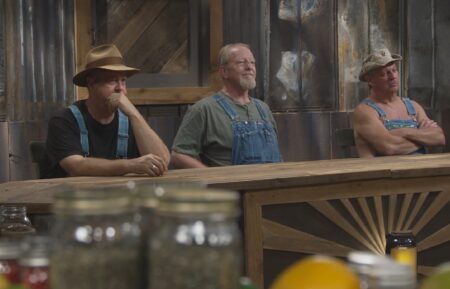‘Another Period’ Finale: Natasha Leggero on Exposing Everyone’s Secrets
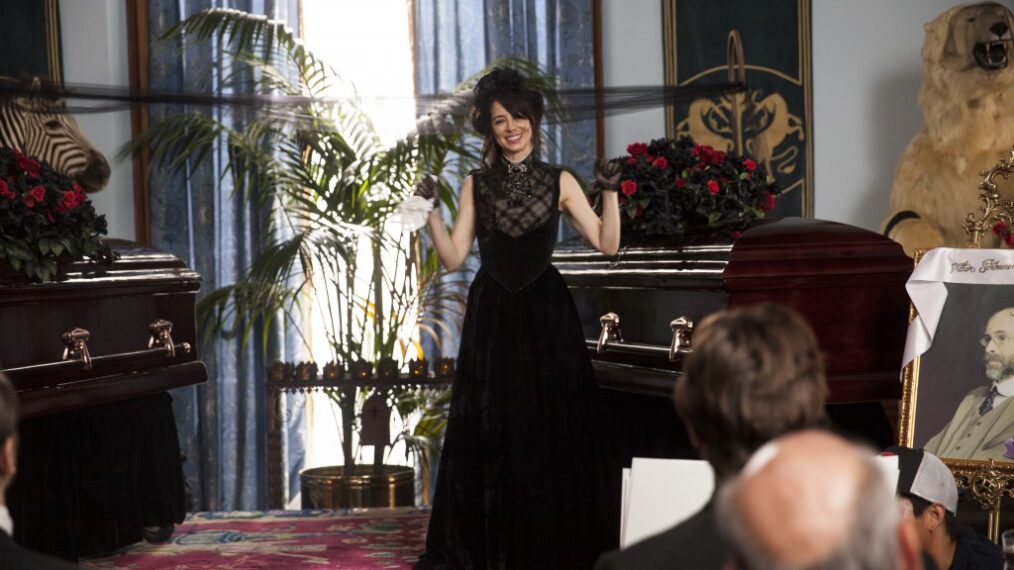
The Bellacourt sisters have finally gotten what they deserve: fame… or at least something resembling it.
On Tuesday night’s season finale of Another Period, all the plot strings came unraveled, exposing every upstairs character for who they really are. That should have proved a nightmare for societal wannabees Lillian and Beatrice, who were banished from Bellacourt Manor for their misbehavior. Instead, a very shiny silver lining has arrived in the form of a front page headline in The Looky-Loo newspaper labeling them “Modern Pigs” and inspiring hordes of fans on the street to ask for their autographs. We caught up with series co-creator, executive producer, writer and star Natasha Leggero to chat about what that means for Newport’s worst—and what’s in store for season two.
First of all, congratulations on getting a second season. Did you see that coming?
We were hoping because last year we felt like we had enough for two or three seasons with all of the stuff that we came up with in the writers’ room.
Is the second season definitely still about the Bellacourts? You’re not doing some type of anthology thing?
Oh, no. It’s going to be the Bellacourts for sure.
In the finale, everyone’s secrets blew up simultaneously. Was this big explosion always the plan?
Not necessarily. The first two weeks of writing in our writers’ room, we tried to… a fellow showrunner called it “blue sky-ing.” You just kind of dream up, “What are all the different scenarios that could happen in the course of a season with all the different characters?” We have, like, 13 characters that we’re tracking. I think Moshe Kasher—one of our writers—was helping us formulate this whole orchestration, and then everything else started to fall into place.
How did Hortense know about everything?
Well, Hortense had been spying on us for a long time, and she doesn’t really have a life. Also through Scoop LaPu—she was kind of using him as a spy as well.
So Celery turned out to be a huge bitch. Is there a Celery in your life that inspired her?
[Laughs] It’s funny; once we thought of Missi [Pyle] to be the character, it kind of wrote itself. We knew we wanted a villainous character that was our natural enemy. Once we had Missi in mind, we were kind of inspired by her, just knowing all of her work because she’s so talented.
Why does Missi automatically equal villain?
Don’t you think Missi just has, like, a bitch face? She really does. I’m sure she wouldn’t be offended by that.
Why was Celery’s family so quick to abandon her?
Well, I think that in Newport society, reputation is everything. Family isn’t the number one thing, it’s society and reputation. And also we’re making a comedy [Laughs].
Is there a chance Chair’s not really dead? Like maybe the baby’s dead, but Chair’s just in a coma?
Yes.
So Christina Hendricks didn’t demand that she die?
No, not at all. In fact, the opposite, so…
Interesting. I’m a little concerned for Blanche’s mental health next season. Is she going to be okay?
I hope so. I just love Blanche. Is she going to be okay? I do think there’s a lot in store for Blanche next season. I can’t really give anything away, but she is going to find herself in some sort of marriage. And I think her mental health will fluctuate [Laughs].
At the end of the finale, the Bellacourt Sisters seem to embrace their notoriety as the “Pig Sisters” because it gets them fame. What’s the message here?
Lillian and Beatrice are trying so hard to fit into society, and they’re sort of getting a taste of negative publicity and seeing that it’s just as great as regular publicity, if not more so. It really does reflect our times. I think the idea is we’re going to see where that takes them, as opposed to just being popular in this small town. They’re getting a taste of becoming negative national news, you know, in the vein of the Kardashians—because we’ve always thought of the show as if the Kardashians were at Downton Abbey.
You visited Newport before this season. Are you planning to go back for more inspiration?
Actually, [director] Jeremy [Konner], Riki Lindhome, Moshe [Kasher] and I just got back a week ago. The thing about Rhode Island and Newport is you have to go in the high season. You can’t really understand it if you’re not there in June to September. It was just so gorgeous, and I think everyone was very inspired, just seeing how everyone lived. They have a servants tour there, so we all went through it. What was great about going back the second time to Newport is a lot of the tour guides recognized us when we walked into the place. So we got to have some personal tours, and one of the women was like, “I’m so sorry I have to stay on the script. I really wish I could tell you about some of the other things we know here at the Historical Society…” [Laughs] So I think we’re maybe planning to go back in the low season and try to take some of these tour guides out for a drink.
You had some big names on the show this season. Are other people begging to be on it next go ‘round?
I’m not going to lie, I’ve gotten a lot of emails from very established actors and comedians who do want to be a part of it. The good thing is at the turn of the century, hotels weren’t really invented, and only rich people were really traveling. So the way things were set up—and you know this from watching Downton Abbey—is that if you had a big house like we have at Bellacourt [Manor], people would be staying with you for three or four days. So the show really does lend itself to have, like, a rotating door for different visiting dignitaries and inventors and society people and kings.
Anyone you’re already hoping to write in?
Danny McBride. We want him to come.
Where do you want the show to head next season?
I’d like to get deeper into the servants’ world a little bit and see what’s happening there because historically, American servants did not want to be servants. In England, I feel like there’s more of a class designation, and people are like, “Well, my grandfather was a butler, and my father was a butlter, and I’ll be a butler.” But this time period that we’re in here in America, this is the beginning of the American dream, and this is the beginning of capitalism. When you go to Newport, you learn that the reason the Gilded Age was so short-lived in America is that people were like, “I’m not going to serve you in your house and not have a life. F–k you.” So there were some really big servant revolts that were so interesting. So I’d love to do the comedy version of that, [exploring] the servants revolting against the upper class and how the upper class will deal with it. I don’t think people understand that there was a real Gilded Age happening in our country, but with more of a very nouveau riche version. People were really living like rappers.
Speaking of rappers, Snoop Dogg performed your theme song after doing the Justin Bieber roast with you. Has Snoop been watching?
You know, I’m not sure. His manager’s been texting me, and I know his manager’s been watching and loves it. But Snoop is the one who talked us into using a more, like, funk beat for the intro. We had something that was a little more trap, and Snoop was like, “Trap is a trend. You don’t want to be part of a trend.” He was like, “You do a funk style with a groove, you’ll get 10 seasons. Trap song? You’ll get one season.” I gotta say, he hasn’t been wrong so far.
From TV Guide Magazine
What to Expect From 'The Hunting Party's Love Triangle and Mystery
Manifest alum Melissa Roxburgh and the showrunner of NBC’s Hunting Party tease TV Guide Magazine about what’s ahead for the “government conspiracy that just keeps unfolding” — plus, the series’ “good” love triangle. Read the story now on TV Insider.

